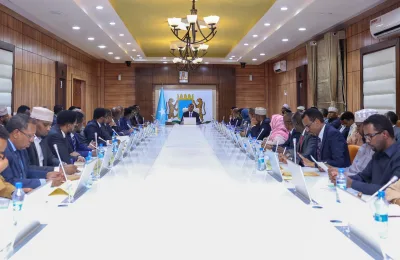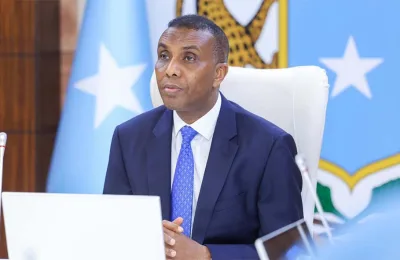(MENAFN – SomTribune) Labor organizers and researchers said they had not heard of Amazon previously coming…

(MENAFN – SomTribune) Labor organizers and researchers said they had not heard of Amazon previously coming to the table after worker pressure, even for private discussions. Soon after Hibaq Mohamed immigrated to Minneapolis from Kenya, where she had been living as a refugee, in 2016 she got a job at a new Amazon warehouse near the city. At first, she enjoyed packing boxes for delivery to consumers.
But over time, she said, Amazon required her and her co-workers to pack at a faster rate, at least 230 items an hour, up from 160. Ms. Mohamed, who is Muslim, said that Amazon let her take paid breaks to pray, as required by state law, but that her managers had told her that she still needed to keep pace.
‘There is just pressure,’ Ms. Mohamed, 24, said. ‘The people they don’t fire worry one day they will be fired.’
Ms. Mohamed and scores of East African colleagues, many of them, like her, born in Somalia, responded in an unusual way for Amazon workers: They organized to complain.
Now, tied together by a close cultural connection and empowered by a tight labor market, they appear to be the first known group in the United States to get Amazon management to negotiate.
After modest protests over the summer, the workers have had two private meetings with management in recent months. Labor organizers and researchers said they were not aware of Amazon coming to the table previously in the United States amid pressure from workers, even for private discussions.
Last week, Amazon offered some compromises at its facilities in the Minneapolis area. The company said it would require a general manager and a Somali-speaking manager to agree on any firings related to productivity rates, designate a manager to respond to individual complaints within five days and meet with workers quarterly.
By Saturday night, though, a group of about 40 workers had decided the compromises were insufficient, with a primary concern being the pace at which they are expected to work. They voted to stage a large protest and walkout on Dec. 14, in the thick of the holiday season.
‘Each community is a little different, and in each one, we work to ensure our employees have a great experience with the most important element being our direct connection to our employees,’ Amazon said in a statement.
Ashley Robinson, a company spokeswoman, added that the company did not see its work with the East African workers as a negotiation but rather as a form of community engagement similar to its outreach efforts with veterans and lesbian, gay, bisexual and transgender employees.
To workers, the formal meetings were the result of more than a year of organizing by the Awood Center, a nonprofit focused on helping East African workers.
Hibaq Mohamed, 24, an Amazon worker.CreditJenn Ackerman for The New York Times Abdirahman Muse, executive director of the Awood Center.CreditJenn Ackerman for The New York Times Khadra Kassim, 31, an Amazon worker.CreditJenn Ackerman for The New York Times Safia Ahmed Ibrahim, 52, an Amazon worker.CreditJenn Ackerman for The New York Times ‘Nobody would assume a Muslim worker, with limited language skills, in the middle of Minnesota can be a leader in a viable fight against one of the biggest employers in the world and bring them to the table,’ said Abdirahman Muse, Awood’s executive director.
Amazon has sought to squeeze more profit out of its operations as growth slows. Brian Olsavsky, the company’s finance chief, told investors in October that ‘getting better efficiencies’ from operations was a corporate priority.
The company now has more than 110 so-called fulfillment centers across the country, and other outposts that handle logistics. Each is like a mini-city, as another company spokeswoman once described them, with a unique culture and demographics.
Somali refugees began resettling in the area in the 1990s, fleeing the country’s growing violence and civil war. More than 46,000 Somali-born residents and their children live in the state. About four out of five live at or near the poverty level.
Amazon recruited East African immigrants heavily with local advertisements and billboards. Hundreds signed up through the Confederation of Somali Community, a nonprofit. For a while, Amazon ran buses to Shakopee from the Minneapolis neighborhood of Cedar-Riverside, known as Little Mogadishu , and the company has spaces at local warehouses dedicated to prayer and the ritual washing custom in Islam.
Sixty percent of Amazon’s 3,000 workers in the region are East African, Awood estimates, but the group has found only one manager who speaks Somali. Amazon said that the number of East Africans was notably lower, and that four of its managers in the area spoke Somali. For one of the meetings with workers, in September, Amazon flew in from Texas a Muslim manager who works on accommodating Islamic practices. He was originally from Libya.
Amazon’s distribution center in Eagan, Minn., outside Minneapolis.CreditJenn Ackerman for The New York Times Amazon’s distribution center in Eagan, Minn., outside Minneapolis.CreditJenn Ackerman for The New York Times Safia Ahmed Ibrahim, 52, said that in Somalia, she worked for American and United Nations aid groups before fleeing to a refugee camp in Ethiopia. She was hired to work at an Amazon sorting facility in 2016.
‘I worked hard, and I got employee of the month,’ she said. It was the first time she really loved a job, she said, and she remains impressed by the business built by Jeff Bezos, Amazon’s founder.







